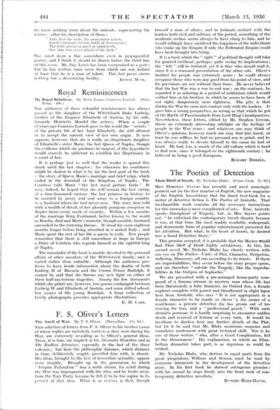F. S. Oliver's Letters
The Anvil of War. By F. S. Oliver. (Macmillan. • 12s. ad.) Tins selection of letters from F. S. Oliver to his brother (some of whose replies arc included), written as they were during the War, are extremely revealing as to Oliver's general ideas. These, it is true, are implicit in his Alexander Hamilton and in The Endless Adventure, especially in the last of the three volumes ; but here the philosophic distance, which distance in time, deliberately sought, provided him with, is absent. His ideas, brought to the test of immediate actuality, appear more roughly. Brought up in the generation to which
Empire Federation " was a noble dream, his mind during the War was impregnated with the idea, and he broke away from the Tory Party because he felt it to be too supine in its pursu:t of that idea. What is so et rIous is that, though himself a man of affairs, and in intimate contact with the leaders both civil and military of the period, something of the academic recluse seems always- to have clung to him, and he would willingly have sacrificed the happiness of the individuals who make up the Empire if only the Federated Empire could have been brought into being.
It is a book which the " right " of political thought will take for granted (without, perhaps, quite seeing its implications) ; the " left " will be irritated, yet it is they who should read it, since it is a reasoned presentation of the other side. Oliver's instinct for people was extremely acute ; he could always recognise those who were any good from his point of view, and his previsions are not without their force. He never believed that the last War was a war to end war ; on the contrary, he regarded it as ushering in a period of militarism which would outlast him or his brother, in which he seems to have been, if not right, dangerously near rightness.' The pity is that during the War he came into contact only with the leaders. It gave him a wrong perspective, as wrong as that which he got of the Battle of Passchendaele from Lord Haig's headquarters. Nevertheless, these letters, edited by Mi. Stephen Gwynn, throw an extremely interesting sidelight on the feelings of people in the War years ; and whatever one may think of Oliver's opinions, however much one may find him harsh, at least he was selfless, he had no personal axe to grind, and he was always ready to devote himself to the cause he had at heart. He had, too, a smack of the old culture which is hard to find now, since it belonged to the eighteenth century ; he believed in being a good European.
BONAMY DOBRliE.














































 Previous page
Previous page